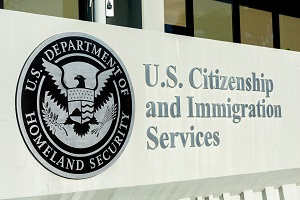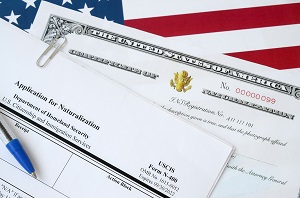Naturalization Lawyer Fixes Application Delays & Denials
Seeking naturalization in the United States is a lengthy process that can be complicated and challenging. By familiarizing yourself with the process and potential delays or denials, you will be better equipped to ensure a smooth journey toward citizenship. With the guidance of an experienced naturalization lawyer, becoming a U.S. citizen is within reach.
Reasons For Delays Or Denials
 One of the most common reasons for delays and denials in naturalization is evidence of a lack of good moral character. The U.S. Citizenship and Immigration Services (USCIS) will review applicants who are applying to determine if they meet the standard, which includes factors such as whether or not the applicant has committed certain criminal acts or broken immigration laws.
One of the most common reasons for delays and denials in naturalization is evidence of a lack of good moral character. The U.S. Citizenship and Immigration Services (USCIS) will review applicants who are applying to determine if they meet the standard, which includes factors such as whether or not the applicant has committed certain criminal acts or broken immigration laws.
In some cases, it may be possible for individuals with criminal records to obtain a waiver for the good moral character requirement. However, waivers are difficult to obtain, and USCIS has strict guidelines about which types of crimes and offenses will be considered eligible for a waiver.
USCIS also performs screenings to ensure that applicants are not a risk to national security or public safety. Some of the factors used in these screenings include whether an applicant has visited certain countries, their employment history, and any suspicious activities that may have been associated with them. If USCIS finds evidence of any risks, it will likely deny the application for naturalization.
USCIS may deny an application for naturalization if the applicant cannot pass the English and civics tests. These tests are designed to ensure applicants have a basic understanding of U.S. history and government and a mastery of the English language. Applicants must provide evidence of their knowledge in these areas before they can be considered for citizenship.
The process by which individuals attempt to gain U.S. citizenship can be complex and daunting, but it is possible with dedication, careful preparation, and help from a naturalization lawyer. Understanding the various reasons why applications may be delayed or denied will help immigrants make informed decisions regarding their naturalization journey and increase their chances of success.
Request A Hearing
If a naturalization application is denied, applicants have the right to request a hearing before an immigration judge to present additional evidence to support their case. The applicant must file Form N-336 within 30 days of the denial. The form is a Request for a Hearing on a Decision in Naturalization Proceedings.
Visit your local USCIS office to attend the hearing. Once you submit Form N-336, you will receive a notice with instructions on when and where to appear for your hearing. Be sure to bring all supporting documents to make the most of your appointment time.
Prepare an explanation in advance as to why you believe an appeal or motion should be granted based on the facts presented. The more knowledge you have about naturalization laws and processes, your explanation will be more effective.
Work with an experienced and skilled naturalization attorney before attending the hearing. They can help you better prepare for your appointment and ensure that all legal requirements have been met, increasing your odds of a favorable outcome.
Administrative Review
If an applicant is not satisfied with the outcome of their hearing, they can appeal the decision to the Board of Immigration Appeals (BIA). You must file a request for an administrative review within 30 days of the date you are notified of the denial of your citizenship application.
To request an administrative review, you must use Form N-336 and file this with the local USCIS district office that denied your citizenship application. You must include the filing fee with your request amounting to $700. Then, USCIS will schedule a review hearing within 180 days from the date you filed the request.
It is better to submit a brief and additional evidence supporting your N-336 request. You may state the reasons for your U.S. citizenship eligibility and enumerate the factors why this is so. Ask for help from your naturalization lawyer to establish these factors and the proper way to file an N-336 appeal.
This process involves submitting a written brief and presenting oral arguments before a panel of three BIA members. The BIA has up to 90 days to issue a decision on an administrative review. So when you undergo this step, it’s advantageous to have a naturalization lawyer to give you the advice to ensure you follow the correct process.
Federal District Court Review
The applicant may also be able to file a petition for judicial review with a Federal District Court if they are not satisfied with the outcome of their administrative review. In this case, it is recommended that they seek legal advice from a naturalization attorney as soon as possible.
When your denied application is under review by a federal district court, it must be de novo or, start from the beginning. It will make its decisions based on the findings of fact regarding your citizenship application. Upon your request, the court will also hold a hearing on the review of your citizenship application. The regulations require that you file the petition for review within 120 days after the final administrative denial of your citizenship application.
Legal Motions
In some situations, it may be beneficial for the applicant to file legal motions to prompt an immediate review of their application. It is important to note that these actions should only be pursued with the advice and guidance of an experienced naturalization attorney.
If all other efforts fail, an applicant may pursue a mandamus lawsuit against the government to compel them to act on their naturalization application. This action must be brought in federal court and typically involves filing a petition along with affidavits and supporting documents.
Mandamus lawsuits are a powerful tool for seeking justice for denied naturalization applications. A mandamus lawsuit, also known as an application for a writ of mandamus, is a legal motion used to order a government agency or official to perform their lawful duties and take the required action. In some cases, the defendant may be ordered to act immediately on the request or claim in question.
Mandamus Lawsuits
When it comes to denied naturalization applications, filing a mandamus lawsuit can help individuals seek justice and force the government agency or office responsible for making decisions about their case to review it properly and make a fair decision.
Filing this type of lawsuit allows applicants to present their case before an independent judge who will then decide if they have been wrongfully denied and if a court order should be issued to reverse the decision. The process of filing a mandamus lawsuit for denied naturalization is complex and requires the assistance of an experienced lawyer.
The attorney must file the petition in federal court with all the necessary documentation, including copies of applications, evidence to support the claims in question, and any relevant case law related to similar circumstances. After filing the petition, it is up to the judge to decide whether or not they will grant relief in the form of a writ of mandamus.
Filing a mandamus lawsuit can prove useful in cases where applicants feel that USCIS unjustly handled their denied naturalization application. It can also be beneficial in cases where applicants feel that the agency failed to review their application fairly and under the correct laws.
In certain situations, even if a mandamus lawsuit is unsuccessful, the court may find that USCIS was arbitrary or capricious in denying an application. It can help lay the groundwork for filing a successful appeal with the BIA and give individuals a fighting chance of achieving justice and reversing their denial decision.
Again, this type of legal action should only be taken under the advisement and guidance of an experienced naturalization attorney. This might be the last chance for you to get legal status in living in the United States permanently. So your paperwork must be complete, accurate, and on time.
Lincoln-Goldfinch Law – Abogados de Inmigración
An experienced naturalization attorney is essential in filing reviews, legal motions, and mandamus lawsuits for denied naturalization applications. Their professional assistance can help ensure that a proper case is made and the necessary evidence is presented to the court to have the best chance of achieving justice.
At the end of the day, it is important for individuals whose naturalization applications have been denied to remember that they are not alone and that there are legal remedies available to try and overturn their decision. Filing a mandamus lawsuit may be just the tool needed to help applicants seek justice and force a review of their denied application.
If you or someone you know has had their naturalization application unfairly refused, please reach out to an attorney. Lincoln-Goldfinch Law – Abogados de Inmigración can help you navigate the naturalization process and any issues you experience along the way.
Contact A U.S. Immigration Attorney Today!
Categories
How To Find Us
What Our Clients Say
“This Lawfirm is great, very professional and helpful. I love that they are always in communication and always available for when you have questions . 100% recommended by me and my family. Thank you Lincoln-Goldfinch Law – Abogados de Inmigración”






